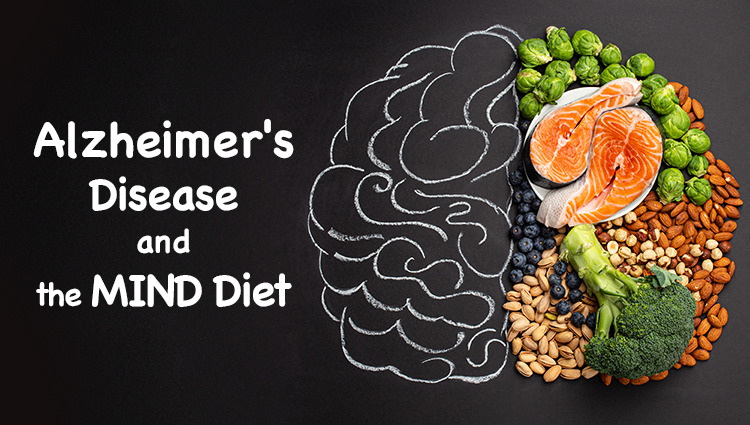
Despite different factors that affect dementia and Alzheimer’s progress, the diet has gained increasing interest among scientists and nutrition experts who works in this field. Researchers say that diet may influence the mechanism underlying Alzheimer’s and dementia. These mechanisms are oxidative stress, inflammation, and vascular abnormalities, which may increase the risk of these diseases. In this regard, a “MIND diet” concept has been introduced to show the possible effect of diet on brain health. Read on to find out more about how to reduce risk of Alzheimer’s.
Contents
What is the MIND Diet Exactly?
This new diet, named by the acronym MIND, combines Mediterranean and DASH diets. The MIND diet creates a dietary pattern that explicitly improves brain health. More precisely, MIND stands for Mediterranean-DASH Intervention for Neurodegenerative Delay (MIND, as two of the healthiest diets, and it is developed to insist on the relationship between foods and brain health. Some researchers confirmed that adherence to the MIND diet might be linked to superior cognitive performance, lower cognitive decline, and decreased dementia risks. In the next section, we will discuss different groups of foods which can be included in the MIND diet.
read this: Superfoods To Help Prevent Alzheimer’s
What Kinds of Foods Include in the MIND Diet?
The MIND diet may reduce risk of Alzheimer’s and includes ten foods such as:
- Green and leafy vegetables: green vegetables like kale, spinach, etc., are paramount consistency of the MIND diet. Try to use at least six or more servings per week to take advantage of them.
- Other vegetables: despite green vegetables, using other vegetables at least once daily will help you stick to the MIND diet. Note that starchy vegetables like potatoes are not included in the diet since they bring lots of calories with a low amount of nutrients for your body.
- Berries: berries family, including strawberry, blackberry, blueberry, and raspberry, are a great source of antioxidants. Eat them at least twice a week.
- Nuts: include five or more servings of nuts per week in your MIND diet. The most beneficial result would be when you have different nuts in your diet and don’t limit yourself to a specific kind.
- Olive oil: if you want to go on a MIND diet, olive oil would be the best choice as cooking oil. This oil contains bioactive ingredients and has a good resistance against boiling heat. In other words, heating olive oil won’t produce harmful components that accelerate dementia progress.
- Whole grains: whole grain consumption of at least three daily servings would greatly help. Such grains include oatmeal, quinoa, brown rice, and meals prepared with these grains, like whole wheat pasta and 100% whole wheat bread.
- Fish: this group of foods contains a high amount of PUFA, Poly Unsaturated Fatty Acids, like omega-3 fatty acids. These ingredients may improve brain functions and may prevent Alzheimer’s. Some fish that are a rich source of PUFA and omega-3 are salmon, sardines, trout, tuna, and mackerel. Use these fish at least once a week.
- Beans: at least four meals of beans per week in the MIND diet would be appropriate. This category contains lentils, soybeans, chickpeas, and other beans.
- Poultry: chicken and turkey meat consumption at least twice a week will be beneficial, except for fried chicken.
- Wine: drinking red and white wine will benefit your brain; a maximum of one glass daily.
Try to consume the determinant number of servings, but if you can’t reach the goal, don’t worry; this diet can still reduce the risk of dementia. However, the more you stick to the diet, the more outstanding results you may gain.

How Can the MIND Diet Reduce Risk of Alzheimer’s?
Researchers claim that the MIND diet can improve brain health and may prevent Alzheimer’s using two mechanisms:
1. Reducing Oxidative Stress and Inflammation
Oxidative stress is a situation through which unstable molecules, free radicals, highly accumulate in the human body. These molecules can damage the body cells, especially the brain, as one of the most vulnerable organs in the human body.
On the other hand, inflammation is a natural body response to injury or infection. However, if your body can’t regulate inflammation properly, this natural response can be harmful and lead to many chronic diseases. Both oxidative stress and inflammation have a determinantal effect on the brain. So, some recent studies have focused on the intervention that reduces those situations to prevent Alzheimer’s disease. Some of these researches showed that specific diets like Mediterranean and DASH diets could reduce oxidative stress and inflammation in the body. Since these diets contain a significant amount of vitamin E, olive oil, berries, green vegetables, etc., containing active compounds called antioxidants, they can protect the brain from oxidative stress. In addition, PUFAs and omega-3 in fish can decrease brain inflammation.
2. Decreasing Harmful Beta-Amyloid Proteins in the Brain
These compounds are protein fragments that are naturally found in the body. However, if they accumulate in the brain and form plaques, they may disrupt communication between brain cells, leading to cell death. On the other hand, scientist claim that plaques are one of the leading causes of Alzheimer’s disease. Since the MIND diet is rich in antioxidants and vitamins, following this diet may help your brain by preventing the formation of harmful beta amyloids in the brain. In addition, some research revealed that saturated and trans fats might contribute to the higher amyloid level in the brain; thereby, because the MIND diet restricts the consumption of such fats, it can be beneficial for brain health and may reduce the risk of dementia.
read here: vitamins to prevent dementia
A Typical MIND Diet Meal Plan for One Week
Due to consumption restrictions, you may think following the MIND diet would be challenging. So, we prepared a sample meal plan for one week based on the MIND diet.
| breakfast | lunch | dinner | |
| Monday | Greek yogurt with raspberries and sliced almonds | Mediterranean salad with olive oil dressing, grilled chicken, whole wheat pita | Burrito bowl with brown rice, black beans, fajita vegetables, grilled chicken, salad, and guacamole |
| Tuesday | Whole wheat toast with almond butter, scrambled eggs | Grilled chicken sandwich, blackberries, carrots | Grilled salmon, side salad with olive oil dressing, brown rice |
| Wednesday | Steel-cut oatmeal with strawberries, hard-boiled eggs | Mexican salad with mixed greens, black beans, red onion, corn, grilled chicken, olive oil dressing | Chicken and vegetable stir-fried brown rice |
| Thursday | Greek yogurt with peanut butter and banana | Backed trot, collard greens, black-eyed Pease | Whole wheat spaghetti with turkey meatballs and marinara sauce, side salad with olive oil dressing |
| Friday | Whole wheat toast with avocado, omelet with peppers and onions | Chili made with ground turkey | Greek seasoned baked chicken, oven-roasted potatoes, side salad, whole wheat dinner roll |
| Saturday | Overnight soaked oats with strawberries | Fish tacos with whole wheat tortillas, brown rice, pinto beans | Chicken gyro with whole wheat pita, cucumber, and tomato salad |
| Sunday | Spinach frittata, sliced apple with peanut butter | Tuna salad sandwich with whole wheat bread, carrots, and celery with hummus | Curry chicken, brown rice, lentils |

Foods You Should Avoid When Going on the MIND Diet
The MIND diet is not only associated with consuming the foods mentioned above but it is also related to avoiding eating some kinds of other foods like:
- Butter and margarine: you should avoid consuming this group of foods more than one teaspoon (14 grams) daily.
- Cheese: in the MIND diet, consuming cheese is recommended less than once a week.
- Red meat: this meat should be consumed no more than their weekly servings in the MIND diet. The red meat group includes beef, pork, lamb, and meat products like hamburgers, sausages, bacon, etc.
- Fried foods: fried foods and fast foods served in restaurants are highly forbidden in the MIND diet due to their high calories and low nutritional values. This diet recommends consuming fried and fast foods less than once a week.
- Pastries, candy, and sweets: this group includes most processed snack foods and desserts like ice cream, cookies, brownies, snack cakes, doughnuts, candy, etc. limit consumption of these junk foods as much as possible.
The five foods mentioned above contain saturated fatty acids associated with several diseases like heart disease and Alzheimer’s, and dementia.
Final Words
Research shows that the foods we eat and our diet might impact brain health and may reduce risk of Alzheimer’s. In this regard, some studies have focused on the MIND diet, a combination of DASH and Mediterranean, as two healthy diets and may prevent Alzheimer’s . Furthermore, some evidence supports the idea of influencing the MIND diet on MIND cognitive improvements.
It’s encouraging to know that there are steps we can take to reduce our risk of developing this devastating condition. The MIND diet is just one of many lifestyle factors that can help to promote brain health; thanks for covering this critical topic.
What other lifestyle factors, besides diet, have been shown to be beneficial in reducing the risk of Alzheimer’s disease?